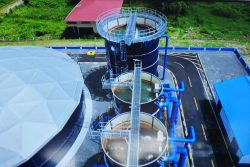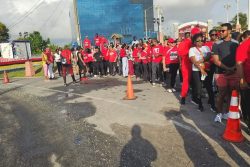Dear Editor,
In February of last year I wrote a comment which you published under the headline ‘Does government have the requisite technical expertise to manage large infrastructure investment?’ In a press release issued by Sithe Global and carried in the papers on February 15th of that year, Sithe cites the letter and mentions the concern I expressed, but makes no comment on it.
The question of our qualifications with reference to project implementation has again been raised, this time by Carl Greenidge of the APNU, and specifically as it relates to Winston Brassington’s position of being, frankly, heavily laden with large projects and perhaps scant supporting expertise in the disciplines that projects of the size involve.
The Sithe Global press release of 18 months ago responds by name to the initiators of the public demands for explication ‒ GHK Lall, M Maxwell and myself. At least in the papers we engaged the company and the politicians about the project. It was not our role, as occasional “letter-writers” to conduct and condense a study of the troubling aspects of the various projects ‒ in sum, doing the politicians’ work for them ‒ when, for the most part, the opposition too seemed, publicly, occupied with other matters or having postponed a discussion about the real significance of what would have had to be prepared and was to be offered for their endorsement in parliament. Lincoln Lewis, in a recent letter seemed to have missed the history and hence part of the lesson of the Sithe Global incident. They, the politicians, like the experts of all sorts, seem to have scrambled aboard after a sufficient mass of public concern had been reached and the hint of opportunity for future corruption publicly discussed.
Having gotten that out of the way, I continue by stating my entire agreement with the APNU/ Carl Greenidge position, which is to be interpreted in the larger sense of ‘the matching of skill sets, either locally procured or contracted abroad, with the requirements of any project is the only way we can advance despite the brain-drain,’ or some such formulation.
In a way the politicians and the media were very effective in their handling of the issue once they seized its significance. But little research done by either side was given to aid public comprehension. In short the matter was of a complexity that its treatment should have been organised by small units within the opposition parties or media.
But we proceed immediately to a declaration that none of the writers mentioned here or the media and politicians to be sure, are in principle against the realisation of “the” or “a” hydro-electric project. This should go beyond scoring political or personal points. And this being so, the lessons of the case need to be understood.
First, to my mind, is to underscore the fact that neither government nor opposition seem permanently equipped with the technical manpower to take or to critically evaluate a project from conception to management to post- construction. In no country is the body of the elected expected to possess all the skills. Consultants are engaged, special committees set up, hearings organised. In modern societies projects of this size/sort are the prime subjects of wide public comment, lobbbying, manipulation of opinion by special interests, comment by academics, etc. In short they are public property and treated as such.
But we come out of the event, now, looking bewildered and overwhelmed. Amateurish. Basic facts such as comparable international costs for airport projects were brought out only by myself and never responded to by any of the project managers. In the case of Amaila, problems with the cost over-runs in the Bujagali hydo project in Uganda were first mentioned in the local press by myself and Mr Maxwell. In fact the basic research and PR/Project Support Communications with ready answers to anticipated questions had not been done. The proposers of the project should, as a government responsible to its people and thus answerable, have been prepared.
Second. It is not if the troubling questions are answered by Sithe to the satisfaction of the government, that the case is closed. Or oppostion questions answered by the government itself to its own satisfaction that they qualify to be labelled ‘answered.’ This seemed to have been a mistake Sam Hinds made in crowing that “since Sithe answered critics have been silent.” He seemed to have been referring to the Sithe meeting sith “stakeholders” in January of last year and its release of Feb 15 last year in response to Mr Lall, Mr Maxwell and myself, none of whom bothered to pursue the matter. In my own case I had absolutely no intention of going further with work that APNU/AFC should have been doing. One even asked if the Office of the Leader of the Opposition is manned by personnel alert to the opportunity (political) in sniping at this type of project.
In short, PR/media relations weakness on all sides.
Sithe made an effort to communicate. Useless in the end, because the politics of the thing (how government should have handled the opposition) was hit-and-miss. Far from giving the appearance of suffering a paucity of paper, answers and facts, the project managers should have flooded the parliament, opposition parties, and the public with a studied, expert opinion rapid-fire response (last year they did not even have a website that we could find), and mobilised the country around the project that is sold not as a PPP triumph, but as a collective achievement. All suffer the embarrassing black-outs and the rest.
But any PR treatment has to stand on facts. To repeat, it is in the capacity to understand and reply to the questions raised that the government should have anticipated critics and criticism and mobilised the country around what it should have sold as a people’s project. It should have looked at the way the media acted in case of the Bujagali project, similarly battered by cost over-runs, and prepared a media policy.
In the case, we end up, again, in a situation where all sides are right. The government is correct in insisting on pushing the project through, the main opposition is right in its demands for a realistic review of the project in all its aspects, and the AFC is right in voting with its heart for a fresh chance at giving us hydro.
Mr Ramotar is to be supported for continuing a project that started in the Burnham seventies, took off again during Jagdeo’s time and is still alive today. It has to be considered and sold as a national and non-partisan objective. Otherwise it could never get off the ground. What the public and opposition has now learned as a lesson is that (it has become almost standard practice by investors in third world countries) there will be a demand for consensual political support. It is usually a matter of political risk and risk insurance costs or a pretext for walking away. In short, we now have to factor in the tendency to make noise and its effects on some investors (here is where the Chinese are a good bet). But we need to know also that consensuality is not inescapable. The World Bank has MIGA to cover some political risk eventualities.
One concludes that, in terms of projects of all types (including police reform, city council reform, NIS reform) the implementation gap is due to lack of technical preparedness.
The country is chronically under-managed. It is why the plethora of reports and studies gathering dust become an eventuality. It is like handing a national development plan to the primitives of one place or the next. It is not only knowledge, nor is it knowledge plus money. It is finally knowledge, means and personnel.
Whatever party wins in the circumstances, is bound to suffer and continue the same. Essequibians will, for the next century, call for a passport office or birth certificate office. The management deficit, essentially human, seems to translate itself into poor delivery of services, including an inability to evaluate, correct and advance. Examples could be named. National Insurance still awaits intelligent treatment. A triumph with a billion dollar hydro is good. Fixing the medical emergency situation, for example, is also good.
Yours faithfully,
Abu Bakr








